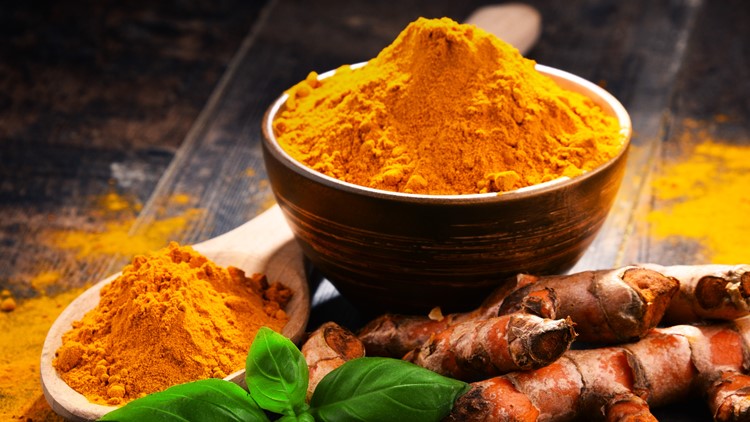Turmeric is a ginger-like plant commonly found in Southeast Asia. The root in its native or powdered form is used as a spice in foods and has also been used as a form of traditional medicine in China and India, according to a Johns Hopkins Medicine webpage. Its usage as a dietary supplement has sparked interest regarding whether it can reduce inflammation and treat diseases, as well concerns about possible health problems caused by supplements.
We VERIFY the answers to four common questions about potential health benefits and concerns regarding turmeric and turmeric supplements.
THE SOURCES
- Mary-Eve Brown, Registered Dietician
- A 2023 study published in The American Journal of Medicine
- A 2022 study published in Phytotherapy Research
- A 2017 study published in Public Health Reports
- A 2018 study published on the Centers for Disease Control and Prevention website
- A 2019 study conducted by the New York City Department of Health and Mental Hygiene
- An article published in Drug Design, Development and Therapy
- A review published in Foods
- Jason Hou, M.D. in a Memorial Sloan Kettering Cancer Center article
- Dina Halegoua-DeMarzio, M.D. said in a Jefferson Health article
- Therapeutic Goods Administration
- A FAQ post published by Mayo Clinic
- An Arthritis Foundation article
- A Johns Hopkins Medicine article
- The Food and Drug Administration
- Mount Sinai
- University of Michigan Rogel Cancer Center
- National Cancer Institute
- Memorial Sloan Kettering Cancer Center
- United States Pharmacopeial Convention
- Oregon State University Micronutrient Information Center
WHAT WE FOUND
1. Can turmeric reduce inflammation?
THE ANSWER
Studies have shown that turmeric root contains an active compound, curcumin, that has anti-inflammatory and antioxidant properties.
Mount Sinai says the curcumin property “lowers the levels of two enzymes in the body that cause inflammation.”
An article published in Drug Design, Development and Therapy explains that curcumin regulates “inflammatory signaling pathways” and inhibits “production of inflammatory mediators.” Mediators are central to the formation of inflammation. Curcumin regulates inflammation by binding to toll-like receptors, which are mediators of inflammation pathways in the gut.
Curcumin acts on immune cells, including the T helper 17 cell that promotes inflammation responses, and the T regulatory cells that fight against it, prohibiting an imbalance that could typically cause inflammation.
A review published in Foods journal also explains that curcumin has prohibited the activation of NF-κB, a powerful inflammatory activator.
However, more studies are needed to determine if turmeric root has an effective amount of curcumin to be used to treat inflammatory diseases in humans.
Oregon State University’s Micronutrient Information Center says that “larger randomized controlled trials are still needed to establish the efficacy of curcumin as an anti-inflammatory agent against rheumatoid arthritis, ulcerative colitis, and radiotherapy-induced dermatitis.”
While more studies are needed to determine if turmeric and curcumin can treat inflammatory diseases, Mount Sinai says eating turmeric in food is safe.
“Anyone who’s trying to manage inflammation could benefit from adding some turmeric to their foods,” says registered dietitian Mary-Eve Brown about the turmeric spice in a Johns Hopkins medicine article.
But there’s a difference between eating turmeric in its native form and ingesting turmeric supplements. Most supplements say they have more curcuminoids, a combination of curcumin and two other compounds found in turmeric, than turmeric in its native root form, although these claims are not regulated or verified by the FDA.
Oregon State University’s Micronutrient Information Center says turmeric root is typically 2-9% curcuminoids, with curcumin representing around 75% of curcuminoids, while many supplements say they contain 95% curcuminoids.
Randy Horowitz M.D. also says in an Arthritis Foundation article that it's not likely that turmeric root will reduce inflammation significantly as “turmeric only contains about 2 to 6% curcumin.”
In a Johns Hopkins Medicine article, registered dietitian Mary-Eve Brown adds that turmeric supplements are “probably not a good idea” because too much curcumin can be risky.
Turmeric supplements with high levels of curcumin can negatively interfere with multiple medications, such as pain relievers, blood thinners and immunosuppressive drugs, according to Brown.
Mount Sinai also provides additional warnings, saying that taking “large amounts of turmeric and curcumin in supplement form for long periods of time may cause stomach upset and, in extreme cases, ulcers.” They add that pregnant and breastfeeding women should not take turmeric supplements. People with diabetes should talk to their doctor before taking turmeric supplements, as they may lower blood sugar levels. Mount Sinai also notes turmeric may act as a blood thinner, so it should not be taken two weeks before surgery.
2. Is turmeric an approved cancer treatment in humans?
THE ANSWER
The FDA has not approved turmeric as a treatment for cancer, and studies have not yet shown whether it can prevent or kill cancer in humans.
The idea that turmeric could help treat cancer stems from the fact that its active element, curcumin, has anti-inflammatory properties.
“Animal and lab studies show that turmeric can help prevent cancer growth and kill certain cancer cells, but we don’t know if it has the same effect in humans,” says Jason Hou, M.D. in a Memorial Sloan Kettering Cancer Center article.
More studies must be done before curcumin and turmeric can be recommended for cancer treatment.
The National Cancer Institute reported that research suggests curcumin may regulate cancer development and progression, but this data is “at most from pilot trials that targeted various stages of cancer and cancer patient populations, and utilized different formulations and doses of curcumin and durations of intervention.”
While turmeric has been “touted as a cancer preventative, or a cancer curative,” Mary-Eve Brown says, “you kind of have to take a lot of that with a grain of salt because there’s studies that are out there, but they’re not big studies and they’re not replicated a lot.”
Mayo Clinic recommends you talk to a healthcare provider before using any herbal supplement to prevent any complications with other medications. There also could be risks to taking turmeric while undergoing cancer treatment.
“Pregnant women need to talk to their obstetrician, people who are on blood thinners need to talk to their physician, people undergoing cancer treatment need to talk to their physician, because it may interfere with the treatment in some things,” Brown says.
Oregon State University’s Micronutrient Information Center explains that so far, most clinical trials on cancer patients have been “aimed at determining feasibility, tolerability, safety, and providing early evidence of efficacy.” They note that in one trial, colon cancer patients were able to tolerate up to 3.6 grams of curcumin supplements per day for four months without major adverse effects.
But in some cases, “turmeric stopped some chemotherapy medications from working against breast cancer cells,” according to the Memorial Sloan Kettering Cancer Center. University of Michigan’s Rogel Cancer Center also says turmeric supplements should be avoided during chemotherapy and radiation therapy especially in breast cancer patients because “curcumin has some estrogenic properties.”
Another study published in 2022 on the breast cancer treatment Paclitaxel noted that the difference in how patients reacted after taking turmeric supplements was a “small magnitude” deemed “not clinically relevant.” In 2020, Mayo Clinic reported that this same breast cancer treatment may result in liver toxicity if combined with turmeric supplements.
A Johns Hopkins Medicine webpage also warned against taking turmeric supplements alongside four chemotherapy agents; Camptothecin, Mechlorethamine, Doxorubicin and Cyclophosphamide.
3. Can turmeric supplements harm the liver in some cases?
THE ANSWER
People can suffer liver damage if they consume too many turmeric supplements, but this is a rare complication.
“We saw a pattern of patients who were presenting with hepatocellular liver injury, which is an inflammation of the liver cells, due to turmeric,” Dina Halegoua-DeMarzio, M.D., says in a Jefferson Health article about turmeric supplements.
She notes that these complications seemed to be most prominent when black pepper was combined with turmeric in the supplements, which changes how the body processes it.
A 2023 study published in The American Journal of Medicine that looked at ten cases of turmeric-associated liver injury also noted a growing number of cases related to liver injury from turmeric supplements.
In June 2023, the Australian Therapeutic Goods Administration found 18 reports of liver problems from people who regularly took turmeric supplements. The administration noted this is a rare risk that may be higher in people taking high doses of the supplement and people with previous liver problems. They also reported that liver injury does not seem to happen when turmeric is consumed in normal amounts as a food.
4. Have some turmeric supplements tested positive for lead?
THE ANSWER
Over the years, there have been cases where lead was found in turmeric supplements. Heavy metals can be found in food if lead is naturally in the environment where food is grown, the FDA explains. The amount of lead in a food or product depends on how much a plant absorbs from its environment, the administration says.
A 2017 study published in the Public Health Reports journal notes that 13 brands of lead-contaminated turmeric were recalled between 2013 and 2016 in the United States.
A 2018 study published on the Centers for Disease Control and Prevention website looked at a variety of spices and herbal remedies in North Carolina. Researchers found that turmeric had one of the highest average lead levels, with an average of 66 mg/kg (also known as parts per billion, or ppb).
A 2019 study conducted by the New York City Department of Health and Mental Hygiene looked at 252 turmeric samples between the years of 2008 and 2017 found that 56% of samples had detectable lead, with concentrations exceeding the permissible limit for lead in food additives.
The FDA says lead is toxic and there is no safe level of lead in food. However, the FDA sets limits on lead levels in some products, as small amounts of lead can be very hard to avoid due to general environmental contamination. For instance, the limit for bottled water is 5 ppb.
The FDA does not set lead limits for supplements or approve supplements prior to them becoming available for consumer use. Its website explains the “FDA is limited to postmarket enforcement because, unlike drugs that must be proven safe and effective for their intended use before marketing, there are no provisions in the law for FDA to approve dietary supplements for safety before they reach the consumer.”
Manufacturers of supplements must report any adverse effects they find out about to the FDA. The administration says they “consider the toxicity of lead and exposure based on the level of lead measured in the food and consumption.” If they find that a food item contains an unsafe level of lead, the FDA works to keep the product from remaining in the food market.
The United States Pharmacopeial Convention has a program called USP Verified Mark, which determines whether a supplement product has harmful levels of contaminants, including lead. Dietary supplements that have been tested and evaluated by the USP and were found to not have harmful levels of contaminants have a verification mark that is used on product labels and packages. This will appear as a yellow, green and black logo that says “Dietary Supplement USP Verified.” You can also find a list of USP verified products here.
This story is also available in Spanish / Lee este artículo también en español: Los beneficios de la cúrcuma para la salud: Hoja de Datos VERIFY



